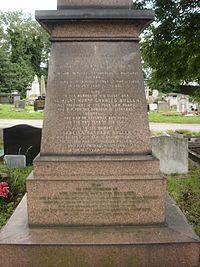- Charles Buller
-
The Right Honourable
Charles Buller
Funerary monument, Kensal Green Cemetery, London. Judge Advocate General In office
8 July 1846 – 1847Monarch Victoria Prime Minister Lord John Russell Preceded by Hon. James Stuart-Wortley Succeeded by William Goodenough Hayter President of the Poor Law Board In office
23 July 1847 – 29 November 1848Monarch Victoria Prime Minister Lord John Russell Preceded by New office Succeeded by Matthew Talbot Baines Personal details Born 6 August 1806
Calcutta, British IndiaDied 29 November 1848
London, EnglandNationality British Political party Whig Spouse(s) Unmarried Alma mater Trinity College, Cambridge Charles Buller (6 August 1806 – 29 November 1848), was a British barrister, politician and reformer.
Contents
Background and education
Born in Calcutta, British India, Buller was the son of Charles Buller (1774–1848), a member of a well-known Cornish family, and Barbara Isabella Kirkpatrick, daughter of General William Kirkpatrick, considered an exceptionally talented woman. He was educated at Harrow, then privately in Edinburgh by Thomas Carlyle, and afterwards at Trinity College, Cambridge, gaining his BA in 1828.[1] He had been admitted to Lincoln's Inn in 1824, and became a barrister in 1831.
Political career
Before this date, however, Buller had succeeded his father as Member of Parliament for West Looe.[2] After the passing of the Reform Bill of 1832 and the consequent disenfranchisement of this borough, he was returned to Parliament for Liskeard, a seat he retained until he died.[3]
An eager reformer and a friend of John Stuart Mill, Buller voted for the Great Reform Bill, favoured other progressive measures, and presided over the committee on the state of the records and the one appointed to inquire into the state of election law in Ireland in 1836. In 1838 he went to Canada with Lord Durham as private secretary. For a long time it was believed that Buller wrote Lord Durham's famous Report on the Affairs of British North America. However, this is now denied by several authorities, among them being Durham's biographer, Stuart J Reid, who mentions that Buller described this statement as a groundless assertion in an article which he wrote for the Edinburgh Review. Nevertheless it is quite possible that the Report was largely drafted by Buller, and it almost certainly bears traces of his influence. He also wrote A Sketch of Lord Durham's mission to Canada, which was never printed. He returned with Durham to England in the same year.
Buller was briefly Secretary to the Board of Control under Lord Melbourne during 1841. After practising as a barrister, he was made Judge Advocate General by Lord John Russell in 1846,[4] and became the first President of the Poor Law Board the following year.[5]
Personal life
Buller died in office in London in November 1848, aged only 42. He never married. He was considered was a very talented man, witty, popular and generous, and is described by Carlyle as "the genialest radical I have ever met". Among his intimate friends were Grote, Thackeray, Monckton Milnes and Lady Ashburton. A bust of Buller is in Westminster Abbey, and another was unveiled at Liskeard in 1905.[6] He left behind him, so Charles Greville says, a memory cherished for his delightful social qualities and a vast credit for undeveloped powers.[7]
References
- ^ Charles Buller in Venn, J. & J. A., Alumni Cantabrigienses, Cambridge University Press, 10 vols, 1922–1958.
- ^ leighrayment.com House of Commons: Waterloo to West Looe
- ^ leighrayment.com House of Commons: Lichfield and Tamworth to London and Westminster South
- ^ London Gazette: no. 20621. p. 2534. 10 July 1846.
- ^ London Gazette: no. 20807. p. 4629. 17 December 1847.
- ^ Leonard Courtney's speech on that occasion of the unveiling of the Liskeard bust was reported in full in The Times, Saturday, Jan 14, 1905; pg. 7; Issue 37604; col C: Mr. Courtney On Charles Buller.
- ^ An appreciation of Charles Buller's life and achievements appeared as an editorial in The Times, Thursday, Nov 30, 1848; pg. 4; Issue 20034; col A.
- T Carlyle, Reminiscences (1881)
- S. J. Reid, Life and Letters of the 1st Earl of Durham (1906)
 This article incorporates text from a publication now in the public domain: Chisholm, Hugh, ed (1911). Encyclopædia Britannica (11th ed.). Cambridge University Press.
This article incorporates text from a publication now in the public domain: Chisholm, Hugh, ed (1911). Encyclopædia Britannica (11th ed.). Cambridge University Press.
External links
- Biography at the Dictionary of Canadian Biography Online
- Charles Buller, Responsible Government For Colonies, Second Edition, London: James Ridgway, Piccadilly, 1840
Parliament of the United Kingdom Preceded by
Charles Buller
Sir Charles Hulse, BtMember of Parliament for West Looe
1830–1831
With: Sir Charles Hulse, BtSucceeded by
Sir Anthony Buller
Sir Charles Hulse, BtPreceded by
Sir William Henry Pringle
Lord EliotMember of Parliament for Liskeard
1832–1849Succeeded by
Richard Budden CrowderPolitical offices Preceded by
Lord Seymour
William ClayJoint Secretary to the Board of Control
1841
With: William ClaySucceeded by
James Emerson Tennent
Hon. Bingham BaringNew office President of the Poor Law Board
1846–1847Succeeded by
Matthew Talbot BainesLegal offices Preceded by
Hon. James Stuart-WortleyJudge Advocate General
1846–1847Succeeded by
William Goodenough HayterCategories:- 1806 births
- 1848 deaths
- Old Harrovians
- Alumni of Trinity College, Cambridge
- Members of the United Kingdom Parliament for English constituencies
- Members of the United Kingdom Parliament for constituencies in Cornwall
- Cornish politicians
- People from Kolkata
- UK MPs 1830–1831
- UK MPs 1832–1835
- UK MPs 1835–1837
- UK MPs 1837–1841
- UK MPs 1841–1847
- UK MPs 1847–1852
- Burials at Kensal Green Cemetery
Wikimedia Foundation. 2010.
